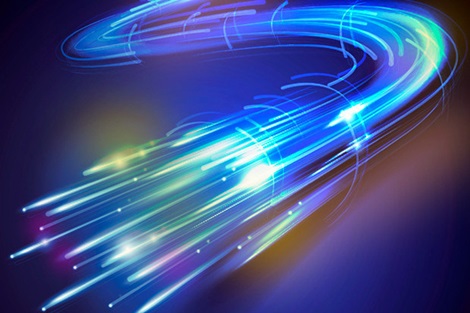It’s a trick question. Fiber internet isn’t faster than any other forms of internet. Internet signals can flow through traditional copper wire just as quickly. At some point we will get to the point where the speed of light, and the speed of electricity through copper, are going to be an issue. But we’re not there yet.
So what’s all this fuss about fiber?
Starting about a decade ago, phone and cable companies started laying fiber to homes and businesses across the country. Before that, the only communications network was huge, messy copper cables.
Then, along came fiber. One strand of fiber roughly the thickness of your finger can carry as much information as a copper cable 3 feet thick. This makes it not only easier to get information to your home, but a lot cheaper. Fiber is made from glass, which is a lot cheaper than copper. Fiber is made to very high tolerances, but it still ends up being a lot cheaper to make.
There’s another thing about fiber. Signals lose strength quickly when traveling through copper wire. Depending on the situation, a signal can lose as much as 90% of its strength when traveling through just 100 feet of copper wire. Signals traveling through fiber stay strong for miles. This means that you don’t need to run electric lines for amplifiers as often.
Real world limitations
When “high speed” internet first came to homes, it came over phone lines. We all started with dialup which is seriously roughly 1,000 times slower than most cell phone data. DSL technology allowed higher speeds than that, up to 3 megabits per second. (Keep in mind your home internet today is probably 50-100 megabits per second.) But that’s where DSL topped out. It wasn’t really a limitation of copper as a material. You can have very fast internet over copper, but you need a lot of copper to do it. The two skinny copper lines that ran to your house in the ’00s couldn’t do it.
Enter fiber
Replacing copper lines with fiber took some time, but it was fairly easy. Because fiber lines are so much thinner, it was pretty easy to run high-capacity fiber to each home. The fact that a skinny fiber run is capable of outperforming a much fatter copper run… that’s the real key here.
A single strand of fiber has the ability to give you faster internet than you can imagine. You could get speeds of 5,000 megabits per second if the whole system were designed to do it. That’s the key. Web sites can’t serve you data that fast (yet.) Networks can’t work that fast (yet.) But fiber can get you there. We’ve gone waaaaay past what copper could do in the average home.
Of course, today’s insanely fast speed will just seem slow by comparison in a few years, and the phone company hopes that fiber will last a long time without needing to be replaced. We keep coming up with new things to do over the internet, and every new thing requires more internet capacity. Just five years ago I scoffed at the idea that you could stream 4K. Streaming 4K still isn’t as good as satellite-delivered 4K, but it is at least possible with today’s connections. In five years we could all be streaming multiple 4K programs or some incredibly detailed type of video that we haven’t even invented yet.
And that’s why it’s a good thing that fiber works better in the home than copper.




